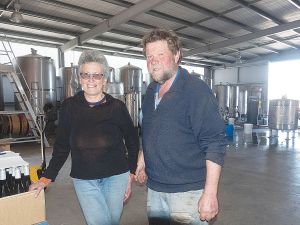Cheaper not better!
Straight 8 Estate Winery owner James Shand says typical New Zealand wine buyers aren't going to help him meet his costs, because they can buy cheap imports at the supermarket.
 Mary Jamieson and James Shand’s Straight 8 is the only winery left in the Burnham area on the southern outskirts of Christchurch.
Mary Jamieson and James Shand’s Straight 8 is the only winery left in the Burnham area on the southern outskirts of Christchurch.
It's a hard road making wine on State Highway One, just south of Christchurch.
That’s the view of the owners of the quirky Straight 8 Estate winery at Burnham Mary Jamieson and James Shand.
It is an area that once boasted about 80ha of vineyards. That included the original Giesens, just a kilometre or so down the road. As well as many smaller vineyards which, like theirs, were originally planted in the 1980s to supply grapes to Giesens.
However, Giesens have long since moved to Marlborough, while the original Giesens plot, which changed hands and operated as the Lone Goat Vineyard for the last 15 years, shut up shop and went into liquidation in January this year.
That makes Straight 8 the only winery left in the area – apart from one very small vineyard that does not produce its own wine.
“I’m the only person actually doing wine, since Lone Goat ceased,” says Shand.
Jamieson and Shand bought the 7.4ha vineyard in 2004. With longstanding connections with motorsport, the couple renamed it after their prized 1935 Railton Light Sports Tourer, with its straight-8 engine, a popular talking point in their public tasting room.
They grow and make wine from Riesling, Chardonnay, Pinot and Cabernet Franc grapes. They sell product from their own shop and also to a small selection of supermarkets and restaurants, mostly in the south.
However, they say the wine industry has changed and it is hard work competing against cheap imports and the big corporates. It is tough getting market traction in an industry that follows fashion and depends on an unsophisticated buying public.
Post-Covid labour woes and increasingly extreme weather are new hurdles.
Jamieson says the last couple of years have been “very frustrating”.
However, she told Rural News she’s not interested in telling a sob story because “every farmer has suffered. It doesn’t matter whether you’ve got sheep, crops, or cattle".
The vineyard recorded 297mm in the big rain of late July, which put them about a month behind in pruning and maintenance.
But the land is freedraining alluvial shingle, which Shand believes will never actually flood.
He says a “good gang” of pruners for their 17,000 vines worked out to about 95 cents a plant prior to Covid, but that’s $2 a plant now.
It has also become hard to get experienced people outside the big growing areas like Waipara and Marlborough.
“I’m very passionate about what I do but everything has snowballed,” he says.
Jamieson adds that people look at winegrowing “through rose-tinted spectacles and think it’s really lovely.
But they don’t understand that it’s once a year and you work all year to get that crop”.
The couple do as much as possible themselves, including making their own compost.
Pest control is largely through organic sprays, and sheep graze between the rows, in lieu of a leafplucker. Sheep will eat the lower leaves but never touch the grapes, Shand says.
Frost control is by an inexpensive tractor-towed Lazo hot-air blower.
They recently bought a second-hand mechanical harvester.
However, bottling is done by a visiting contractor with a mobile bottling plant since they don’t have the volume to justify the expense of their own.
“Other than bottling, we are 100% reliant on ourselves,” Shand explains.
This spring, he had one of his four part-time workers potting up 100 Chardonnay cuttings to take root and be used as vine replacements.
Legally, vineyards should only plant vines grafted onto certified disease- resistant rootstock, he admits.
“But you can’t buy anything from a nursery because they’re fully booked for three years.
“The block needs a hundred-odd plants in it. That’s 250kg of grapes missing. And I’ve got the infrastructure there to do it, so why not replace them?”
Shand says even grafted vines can get disease, die or fail to thrive, and they cost $6.50 to $7 a plant.
An independent report, prepared for Alliance farmer shareholders is backing the proposed $250 million joint venture investment by Irish company Dawn Meats Group.
Whangarei field service technician, Bryce Dickson has cemented his place in John Deere’s history, becoming the first ever person to win an award for the third time at the annual Australian and New Zealand Technician of the Year Awards, announced at a gala dinner in Brisbane last night.
NZPork has appointed Auckland-based Paul Bucknell as its new chair.
The Government claims to have delivered on its election promise to protect productive farmland from emissions trading scheme (ETS) but red meat farmers aren’t happy.
Foot and Mouth Disease outbreaks could have a detrimental impact on any country's rural sector, as seen in the United Kingdom's 2000 outbreak that saw the compulsory slaughter of over six million animals.
The Ministry for the Environment is joining as a national award sponsor in the Ballance Farm Environment Awards (BFEA from next year).

OPINION: For years, the ironically named Dr Mike Joy has used his position at Victoria University to wage an activist-style…
OPINION: A mate of yours truly has had an absolute gutsful of the activist group SAFE.